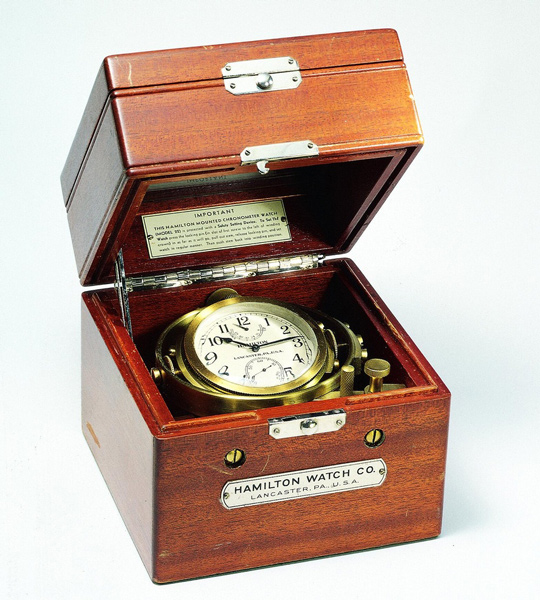In Lancaster, Pennsylvania, Surveyor General Andrew Ellicott writes a letter about some navigational instruments he believes are intended for Meriwether Lewis. In Washington City, James Madison writes an alternate plan for the Louisiana negotiators.
Navigational Chronometer
Hamilton Model 22 (c. WW II)
Hamilton Watch Company. Permission given via the Creative Commons Attribution-ShareAlike 3.0 Unported license.
Meriwether Lewis would purchase his gold chronometer from Thomas Parker, a clock and watchmaker in Philadelphia. The Hamilton Watch Company originally of Lancaster, Pennsylvania made chronometers and watches in the same tradition.
Time Pieces
Lancaster April 18th. 1803
Dear Sir [Thomas Jefferson]
A few days ago I received a letter from Mr. John Vaughan from which the following is an extract, “I am desired . . . to enquire as soon as may be of Mr. Ellicott the cost of a Box, with the sextant, and portable horizon, and a place for an Arnold watch, (such as Mr. Ellicott describes in the 5th. Vol. of the Phil: Trants.,) we have the Watch, and wish for the rest made under the inspection of Mr. E. if possible if it can be done reasonably in order to settle longitudes, and latitudes, in this country.”—
I immediately replied to Mr. Vaughan’s letter, and undertook to have the apparatus for an artificial, or portable horizon, made in this place under my own inspection.—
Notwithstanding the manner in which this business is covered, I feel a strong presumption that the apparatus is for Captn. Lewis, and under this impression I have enclosed a few remarks for his use.
I am Sir, with sentiments of great esteem, your sincere friend and Hbl: Servt.
Andw; Ellicott.[1]Andrew Ellicott to Thomas Jefferson, Founders Online, National Archives, founders.archives.gov/documents/Jefferson/01-40-02-0162-0001 accessed 12 May 2022. [Original source: The Papers of Thomas … Continue reading
Alternate Plan
In accordance with the 8 April 1803 cabinet decision to ally with Great Britain should the Louisiana negotiations fail with France, Secretary of State James Madison, writes a long, encoded letter of instructions for James Monroe and Robert Livingston. President Jefferson provides the required commissions and letters of credence with the names left blank so that either minister can serve in Great Britain if needed.
Washington Department of State
April 18th 1803.Gentlemen
. . . . .
If the French government instead of friendly arrangements or views should be found to meditate hostilities or to have formed projects which constrain the United States to resort to hostilities . . . communications are then to be held with the British government.
Herewith enclosed are two blank plenipotentiary commissions and letters of credence to the French and British governments. Those for the British government are to be filled with the name of M Monroe unless his mission to France should have an issue likely to be disagreeable to Great Britain; in which case the president would wish M Livingstons to be inserted . . . . To provide for the event of M Livingstons translation a letter of leave is inclosed.
Whether the French or the Spaniards, or both, are to be our neighbours, the considerations which led to the measures taken with respect to these important objects still require that they should be pursued into all the success that may be attainable. With sentiments of High Respect and Consideration, I have the Honor to be, Gentlemen, Your Very Obedt servt.
James Madison[2]James Madison to Robert R. Livingston and James Monroe, Founders Online, National Archives, founders.archives.gov/documents/Madison/02-04-02-0632 accessed 30 May 2022. [Original source: The Papers of … Continue reading
Experience the Lewis and Clark Trail
The Lewis and Clark Trail Experience—our sister site at lewisandclark.travel—connects the world to people and places on the Lewis and Clark Trail.
Plan a trip related to April 18, 1803:

Notes
| ↑1 | Andrew Ellicott to Thomas Jefferson, Founders Online, National Archives, founders.archives.gov/documents/Jefferson/01-40-02-0162-0001 accessed 12 May 2022. [Original source: The Papers of Thomas Jefferson, vol. 40, 4 March–10 July 1803, ed. Barbara B. Oberg. Princeton: Princeton University Press, 2013, pp. 222–223.] |
|---|---|
| ↑2 | James Madison to Robert R. Livingston and James Monroe, Founders Online, National Archives, founders.archives.gov/documents/Madison/02-04-02-0632 accessed 30 May 2022. [Original source: The Papers of James Madison, Secretary of State Series, vol. 4, 8 October 1802–15 May 1803, ed. Mary A. Hackett, J. C. A. Stagg, Jeanne Kerr Cross, Susan Holbrook Perdue, and Ellen J. Barber. Charlottesville: University Press of Virginia, 1998, pp. 527–533.] |

